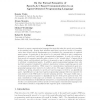Free Online Productivity Tools
i2Speak
i2Symbol
i2OCR
iTex2Img
iWeb2Print
iWeb2Shot
i2Type
iPdf2Split
iPdf2Merge
i2Bopomofo
i2Arabic
i2Style
i2Image
i2PDF
iLatex2Rtf
Sci2ools
136
click to vote
JAIR
2007
2007
On the Formal Semantics of Speech-Act Based Communication in an Agent-Oriented Programming Language
Research on agent communication languages has typically taken the speech acts paradigm as its starting point. Despite their manifest attractions, speech-act models of communication have several serious disadvantages as a foundation for communication in artificial agent systems. In particular, it has proved to be extremely difficult to give a satisfactory semantics to speech-act based agent communication languages. In part, the problem is that speech-act semantics typically make reference to the “mental states” of agents (their beliefs, desires, and intentions), and there is in general no way to attribute such attitudes to arbitrary computational agents. In addition, agent programming languages have only r semantics formalised for abstract, stand-alone versions, neglecting aspects such as communication primitives. With respect to communication, implemented agent programming languages have tended to be rather ad hoc. This paper addresses both of these problems, by giving semantics ...
Related Content
| Added | 15 Dec 2010 |
| Updated | 15 Dec 2010 |
| Type | Journal |
| Year | 2007 |
| Where | JAIR |
| Authors | Renata Vieira, Álvaro F. Moreira, Michael Wooldridge, Rafael H. Bordini |
Comments (0)

